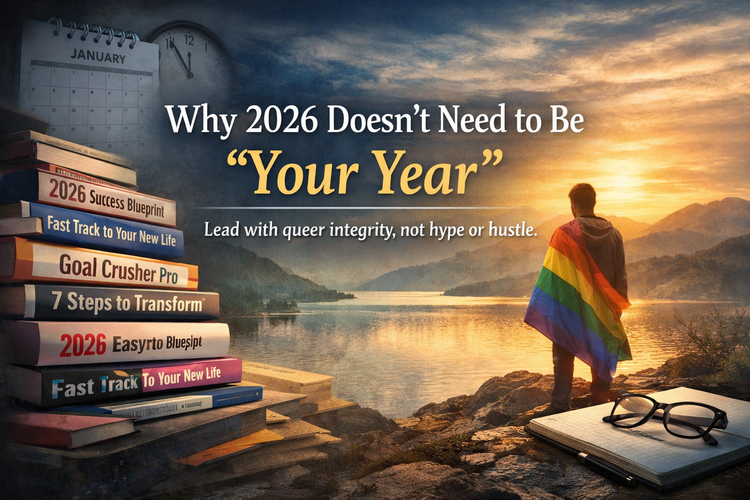The Way You Think Is the Way You Lead

How do you actually think—as a process?
Do you sit down and think, I am going to think now? (As if you weren’t already thinking.)
What I'm inviting you to consider is not the how of thinking—which would be some neuroscience-based answer.
Instead, How do you think in ways that are curious, flexible, humane, and logical?
Contrast that question with, What does your thinking look (and feel) like when it is normative (uniform), rigid, and uncompromising?
Thinking for the well-being of your leadership
Here's what I believe:
Thinking "well" is an expression of your adaptability, curiosity, emotional intelligence, and logical reasoning.
This kind of thinking is necessary for leadership that inspires others to follow your lead, take up a meaningful cause, and play well together as a team.
In my view, anything less is not true leadership. Instead, it's management, supervision, or at worst, a dictatorship.
So, why are adaptability, curiosity, emotional intelligence, and logical reasoning vital to the integrity of leadership?
Because these four ways of thinking are not just useful—they're essential to ethical, human-hearted leadership.
Adaptability
When you are adaptable, you are open-minded, flexible, and yielding in your thought process.
Did you know that a bamboo tree can bend to near-horizontal in high winds without breaking? When the storm passes, it returns to its natural state as if nothing happened.
Being adaptable means you can and will change your mind—your old ways of thinking—when you learn something new, or when confronted with information that challenges your past assumptions or beliefs. You will bend back into what you hold to be true without resistance.
This doesn't mean you accept new information blindly. Rather, you yield to recognizing what you don't know—and then add that new information to the understanding of who you are and how you think.
Curiosity
The antidote to prejudice is curiosity.
Here's an insightful question to know if you are inclined towards curiosity as your default way of thinking:
Do you find yourself more often arguing your opinion to be right, or inviting curiosity to hear about other people's ideas and perspectives?
Curiosity is foundational to creativity, learning, and out-of-the-box thinking. It is characterized by wonder, the pursuit of understanding, and the willingness to embrace new perspectives.
As a leader, cultivating curiosity with your team invites thoughtful, creative ideas and fuels innovation in a quicker, invitational, and less rigid manner.
Curiosity can also break down barriers and resistance to change, especially in someone else who may have been expecting you to defend your standpoint or contest theirs. When you seek to understand, you build a bridge of connection.
Emotional Intelligence
To know thyself, manage how you feel, and understand others—that’s emotional intelligence.
The most well-known and respected leaders (including those you have worked with whom you admire) all possess a high degree of emotional intelligence.
Emotional intelligence is your ability to notice how you think and feel—and how well you cultivate and manage your preferred emotional states. This begins with understanding your emotions, what causes them (both the good and the bad), and the conscious practice of paying attention to how you want to feel.
The better you're able to manage your emotions, the more receptive you become to how others feel, making it easier to navigate relationships, communicate for understanding, and think logically and reasonably.
Have you ever felt deeply seen, understood, and appreciated by someone else? That's a sign of the quality of their emotional intelligence—and it’s a skill that can be developed.
Reasoning
You don’t have to be a philosopher to think clearly and reasonably.
Critical thinking is defined as questioning, analyzing, interpreting, and evaluating to make a judgement. There's something harsh about that explanation: to make a judgement. It reads like something final or fixed.
I believe we need to be reasonable in our logical thinking to avoid dogma and rigidity. Being reasonable in one's thinking is like the flexible bamboo, able to yield to high winds—arguments or dissent—without breaking.
Being reasonable also means forming sound considerations that lead to appropriate, fair, and sensible outcomes in one's thinking. This kind of thinking requires compassion and human-heartedness, qualities that foster connection and recognize the inherent dignity of others.
Leadership doesn’t just guide others—it creates a better future—one act of human-hearted courage at a time.
If these ideas resonated with you and you’re exploring how to lead with more clarity, conviction, and human-hearted courage, I’d love to connect.
✴️ You can book a 1:1 strategy session with me to clarify your leadership direction and elevate the way you think, conduct yourself, and communicate.
🤝 Or, if you’re looking for community and conversation around these ideas, join my private Facebook group, where thoughtful, change-driven leaders gather to support each other’s growth.





Member discussion